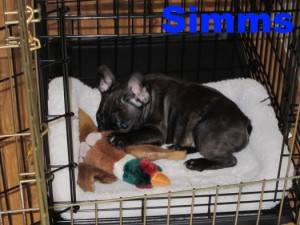 This is one of the best puppy house training tips we have to offer. Training your French bulldog puppy to be comfortable in a crate is a good way to keep him safe and confined during housetraining. Most puppies will quickly accept crate confinement when you make the introduction fun. Since it’s important to associate favorable things with the area where your puppy is confined, it is a good idea to play with him there, or simply spend some time reading or watching television nearby as he relaxes with a favorite chew toy. If he is only in the area when you leave, it becomes a social isolation area that he eventually may resist entering.
This is one of the best puppy house training tips we have to offer. Training your French bulldog puppy to be comfortable in a crate is a good way to keep him safe and confined during housetraining. Most puppies will quickly accept crate confinement when you make the introduction fun. Since it’s important to associate favorable things with the area where your puppy is confined, it is a good idea to play with him there, or simply spend some time reading or watching television nearby as he relaxes with a favorite chew toy. If he is only in the area when you leave, it becomes a social isolation area that he eventually may resist entering.
A good time to start crate training is at dinnertime. Feed your French bulldog puppy his dinner, one piece at a time, by tossing pieces of kibble into the crate for him to chase and eat. This way, you can make a game out of training.
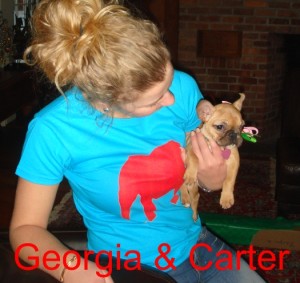 When you pick up his toys, store them in the crate so he will enter on his own to play. You may even want to occasionally hide a biscuit in the crate as a nice surprise.
When you pick up his toys, store them in the crate so he will enter on his own to play. You may even want to occasionally hide a biscuit in the crate as a nice surprise.
You should not use the crate for periods that exceed the length of time the pet can actually control the urge to urinate or defecate. If you are gone for long periods each day, you will need to provide a larger confinement area. You may want to consider using an exercise pen or small room.
Provide an area large enough so that if your puppy has to potty when you are gone, he can do it in a space that is separate from his sleeping area. A 15- to 30-square foot area is adequate for most puppies. If he chooses a specific place to eliminate, cover it with paper to make cleanup easier.
Expect Some Mistakes…
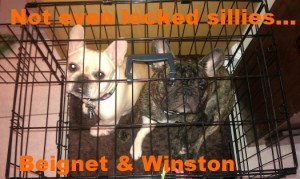 Left on his own, the untrained puppy is very likely to make a mistake. Close supervision is a very important part of training. Do not consider your puppy house-trained until he has gone at least four consecutive weeks without pottying in the house. For older dogs, this period should be even longer. Until then:
Left on his own, the untrained puppy is very likely to make a mistake. Close supervision is a very important part of training. Do not consider your puppy house-trained until he has gone at least four consecutive weeks without pottying in the house. For older dogs, this period should be even longer. Until then:
- Your French bulldog should constantly be in your sight.
- Baby gates can be helpful to control movement throughout the house and to aid supervision.
- Keep them in the crate when unsupervised.
When you’re away from home, sleeping or if you’re just too busy to closely monitor your pet’s activities, confine him to a small, safe area in the home.
Nervous Wetting…
If your puppy squats and urinates when he greets you, he may have a problem called submissive urination. Dogs and puppies that urinate during greetings are very sensitive and should never be scolded when they do this, since punishment inevitably makes the problem worse.
Most young puppies will grow out of this behavior if you are calm, quiet and avoid reaching toward the head during greetings. Another helpful approach is to calmly ask your dog to sit for a very tasty treat each time someone greets him.
Direct Him Away from Problem Areas…
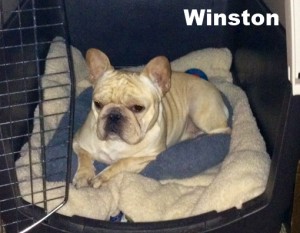 Urine and fecal odor should be thoroughly removed to keep your dog from returning to areas of the home where he made a mess.
Urine and fecal odor should be thoroughly removed to keep your dog from returning to areas of the home where he made a mess.
- Be sure to use a good commercial product made specifically to clean up doggy odors. Follow the manufacturer’s recommendations for usage.
- If a carpeted area has been soaked with urine, be sure to saturate it with the cleaning product and not merely spray the surface.
- Rooms in the home where your dog has had frequent mistakes should be closed off for several months.
- He should only be allowed to enter when accompanied by a family member.
Don’t Make Things Worse…
It is a rare French bulldog or puppy that can be house-trained without making an occasional mess, so you need to be ready to 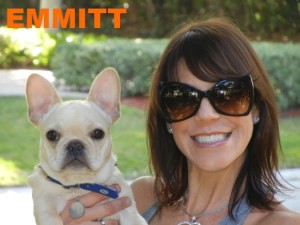 handle the inevitable problems.
handle the inevitable problems.
- Do not rely on harsh punishment to correct mistakes. This approach usually does not work, and may actually delay training.
- An appropriate correction consists of simply providing a moderate, startling distraction. You should only do this when you see your dog in the act of pottying in the wrong place.
- A sharp noise, such as a loud “No” or a quick stomp on the floor, is all that is usually needed to stop the behavior. Don’t be too loud or your pet may learn to avoid going in front of you, even outdoors.
Practice Patience…
- Don’t continue to scold or correct your dog after he has stopped soiling. When he stops, quickly take him outdoors so that he will finish in the appropriate area and be praised.
- Never rub your French bulldog’s nose in a mess. There is absolutely no way this will help training, and may actually make him afraid of you.
Success!
We hope you’ve found these puppy housetraining tips helpful. The basic principles of housetraining are pretty simple, but a fair amount of patience is required. The most challenging part is always keeping an eye on your active French bulldog puppy. If you maintain control, take your Frenchie outdoors frequently and consistently praise the desired behavior, soon you should have a house-trained companion.
